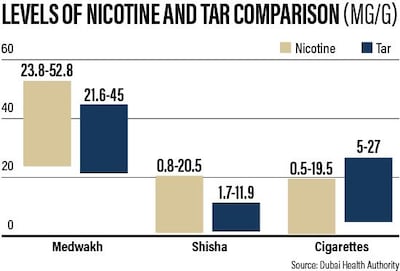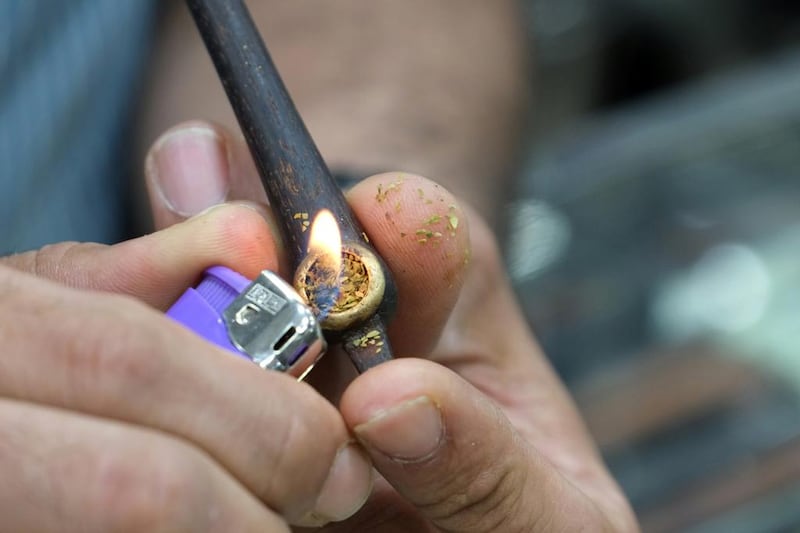Smoking dokha with a medwakh pipe is likely to be much more hazardous than smoking cigarettes and other tobacco products, a recent study has showed.
The research revealed that medwakh has much higher nicotine and tar levels than cigarettes. Shisha was also found to pose significant health risks and the overall results contradict the “widespread belief among teenagers” that medwakh and shisha are safer than cigarettes.
In their paper, which looked at nicotine and tar levels in an array of tobacco products, the scientists in Sharjah and Dubai criticised shisha manufacturers who “falsely present shisha as a healthier and more natural alternative to cigarettes”.
As reported in The National this month, another recent study also highlighted the hazards of medwakh pipes and shisha. Research carried out as part of the UAE Healthy Future Study found that both forms of smoking affect bacteria in the mouth, potentially increasing the risk of heart disease and other illnesses.
Released in the Journal of Analytical Toxicology, the new study on nicotine and tar levels was carried out by researchers from the University of Sharjah and Rashid Hospital in Dubai.
In the paper, the researchers said people who smoke medwakh or shisha are at “high risk” of developing lung cancer, chronic obstructive pulmonary disease, emphysema and coronary artery disease “owing to the high levels of nicotine and tar present in dokha and shisha tobacco products”.
Nicotine levels in medwakh products tested ranged from 23.8 to 52.8 milligrams per gram (mg/g), in shisha they were between 0.8 and 20.5 mg/g and in cigarettes between 0.5 and 19.5mg/g.
For tar, the range in dokha was between 21.6 and 45.0 mg/g, while in shisha it was between 1.7 and 11.9 mg/g. Cigarettes had tar levels between 5.0 and 27.0mg/g.

The findings for medwakh were “really surprising”, according to the study's first author, Dr Bassam Mahboub, assistant dean at the University of Sharjah Medical College and head of the Emirates Allergy and Respiratory Society.
“You are 10 times more likely to be addicted to nicotine if you start smoking dokha [the tobacco used in medwakh pipes] compared to smoking cigarettes, which is alarming, since most young people are using this kind of smoking pipe and they think it's pure nicotine and it's harmless,” he said.
“We need to do more research to find the long-term effects of dokha and whether the conventional smoking cessation methods are useful with this kind of smoking.”
The smoking of shisha and medwakh pipes, is widespread in the UAE and neighbouring countries, despite the health risks. Shisha is often offered in fruit flavours.
As of last year, the UAE has had a 100 per cent tobacco tax, but in their paper, the researchers call for taxes on tobacco products to be raised.
________________
Read more:
New study of Emiratis provides further evidence that smoking medwakh leads to heart disease
It’s all too easy for teens to buy dokha
________________
One of the authors, Ayesha Mohammad, a lecturer in the University of Sharjah's Department of Chemistry, said until now there had been “no precise data” on nicotine and tar levels in medwakh and shisha. This research is the first, she said, to quantify nicotine and tar quantities using a chemical technique called gravimetric analysis.
She said the data leads to the conclusion that “smoking dokha is likely to be more hazardous than smoking cigarettes and other tobacco products”.
“Traditional medwakh and shisha pipes have no filters, so a variety of toxicants in tobacco smoke can quickly enter the lungs, and it contains a high amount of tar,” said Ms Mohammad.
The other authors are Dr Ayssar Nahlé, Omar Al Assaf and Hamdan Al Zarooni of the University of Sharjah, and Dr Mayank Vats of Rashid Hospital.
Although the new study has increased scientists' understanding of the risks that medwakh and shisha pose, much remains to be learnt. The researchers are in the late stages of a study on heavy metals in dokha and shisha products.
“In the future, we are planning to do research to know to what extent these tobacco products can damage human organs and cause lung cancer and cardiovascular diseases,” said Ms Mohammad.
A respiratory medicine specialist, Dr Noordin Wadhvaniya, of the Canadian Specialist Hospital in Dubai, warned that “one bowl of dokha equals five to six cigarettes in one hit”.
“Shisha and medwakh are more dangerous forms of tobacco smoke and cause more harm than cigarettes and must be stopped,” he said.
“Smoking tobacco through water does not filter out cancer-causing chemicals. Water-filtered smoke can damage the lungs and heart as much as cigarette smoke. The inhaled smoke still contains carcinogens and is dangerous.”






